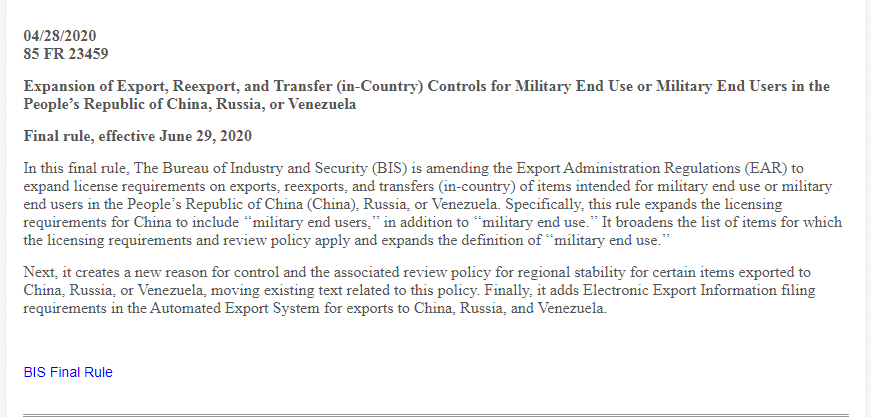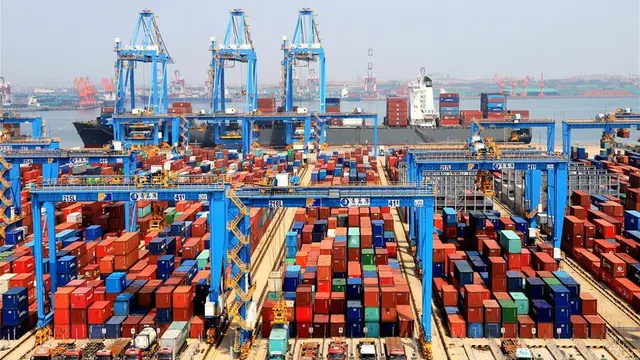
An automatic container dock operates in Qingdao, east China's Shandong Province. /Xinhua
**Editor's note: **Daryl Guppy is an international financial technical analysis expert.He has provided weekly Shanghai Index analysis for Chinese mainland media for more than a decade. Guppy appears regularly on CNBC Asia and is known as "The Chart Man". He is a national board member of the Australia China Business Council. The article reflects the author's views, and not necessarily those of CGTN.
Extra-territoriality – it's a difficult word to pronounce as well as being a discredited concept from the age of imperialism.
You would be wrong in thinking it's outdated because extra-territoriality is making a comeback in a new form that impacts the ability of business to do business. This has the potential for a major impact on international trade, innovation and investment.
Extra-territoriality used to mean a parcel of land carved out of another nation where the laws of the imperial colonial power applied. The most infamous were the British, French and German concession areas in China. The concept lingers today with diplomatic compounds being extra-territorial. They and their staff are exempt for the laws of the country in which they are located.
Extra-territoriality has now gone digital. It is enforced not with gunboats, but with digital lockouts. On June 29, the U.S. Bureau of Industry and Security is introducing U.S. regulations with extra-territorial effect. At first glance the proposed law seems to impact only U.S. companies, but a closer reading identifies wider application.
The Bureau of Industry and Security is amending the Export Administration Regulations to expand license requirements on exports, re-exports and in-country transfers of items intended for military end use or military end users in China. It broadens the list of items for which the licensing requirements and review policy apply and expands the definition of "military end use."
Beyond the obvious items for direct military use, this is a very board definition. How will the product ultimately be used and who will ultimately use the product determine the need for licensing. The new rule broadens the definition of military end uses to include any item that "supports or contributes" to the operation, installation, maintenance, repair, overhaul, refurbishing, "development," or "production," of military items.

Screenshot of U.S. Export Administration Regulations amendment notice on U.S. Bureau of Industry and Security's official website.
In summary, these regulations aim to control the export of dual-use items. These are items that have both civilian and military application and that's the first concern because modern military is like a large corporation and draws on just as many items for its operation from office supplies to ordinary motor vehicles.
The electronic infrastructure that keeps a corporate operating and software that manages corporate logistics flows is no different to the requirements of a military application. Now this would be labelled as dual use because it "supports or contributes" to the operation of military items.
If this were just a purely American impact, then it would be of little concern. One aspect of the U.S.-China Business Council (USCBC) concerns relates to the use of U.S. items in goods manufactured overseas which are then subsequently exported to China.They are concerned that foreign companies currently buying U.S. parts will source these components from elsewhere, so they do not have to seek an export license from the U.S. Department of Commerce.
The USCBC submission identifies a third component of concern and this is the term "re-export." At face value this means, for instance, selling U.S. weapons to a company based in a neutral country and then re-exporting these items to China.
A more detailed reading by the USCBC suggests this also applies to components and software that are imported from the U.S. and used in the creation of a new product that is subsequently exported to China where it may be labelled as dual use because it "supports or contributes" to the operation of military items.
This may apply to water purification technology and equipment to cities with military bases, to cold chain logistics software that enables fresh food supply to supermarkets and military bases and to environmental monitoring software that provides enhanced weather forecasting essential for agriculture and military operations.
The net cast by "supports or contributes" to the operation of military items can be very wide. The current U.S.-China relations encourage a very wide net that captures not just U.S. companies but also their non-Chinese clients.
As the USCBC submission notes, "affected foreign companies will actively look to adjust their procurement, strategies to ensure their products are not subject to" the U.S. licensing country.
This activity may also be captured by the "re-exports" provision. The reach of U.S. regulations beyond the statutory borders of the United States is a modern exercise in extra-territoriality.
Unlike the gunboat enforcement of the old, the modern enforcement method is achieved through the weaponizations of the U.S. dollar dominated SWIFT trade settlement system. A unilateral decision taken by U.S. regulators can eject a non-compliant company from the ability to transact international business in U.S. dollars.
This underlines the urgent need to depoliticize the SWIFT settlement system, or, if this is not possible, replace it with an international trade settlement system that cannot be unilaterally weaponized. Extra-territoriality has a role to play in diplomatic posts but no other place in modern international relations.
(If you want to contribute and have specific expertise, please contact us at [email protected])
 简体中文
简体中文



